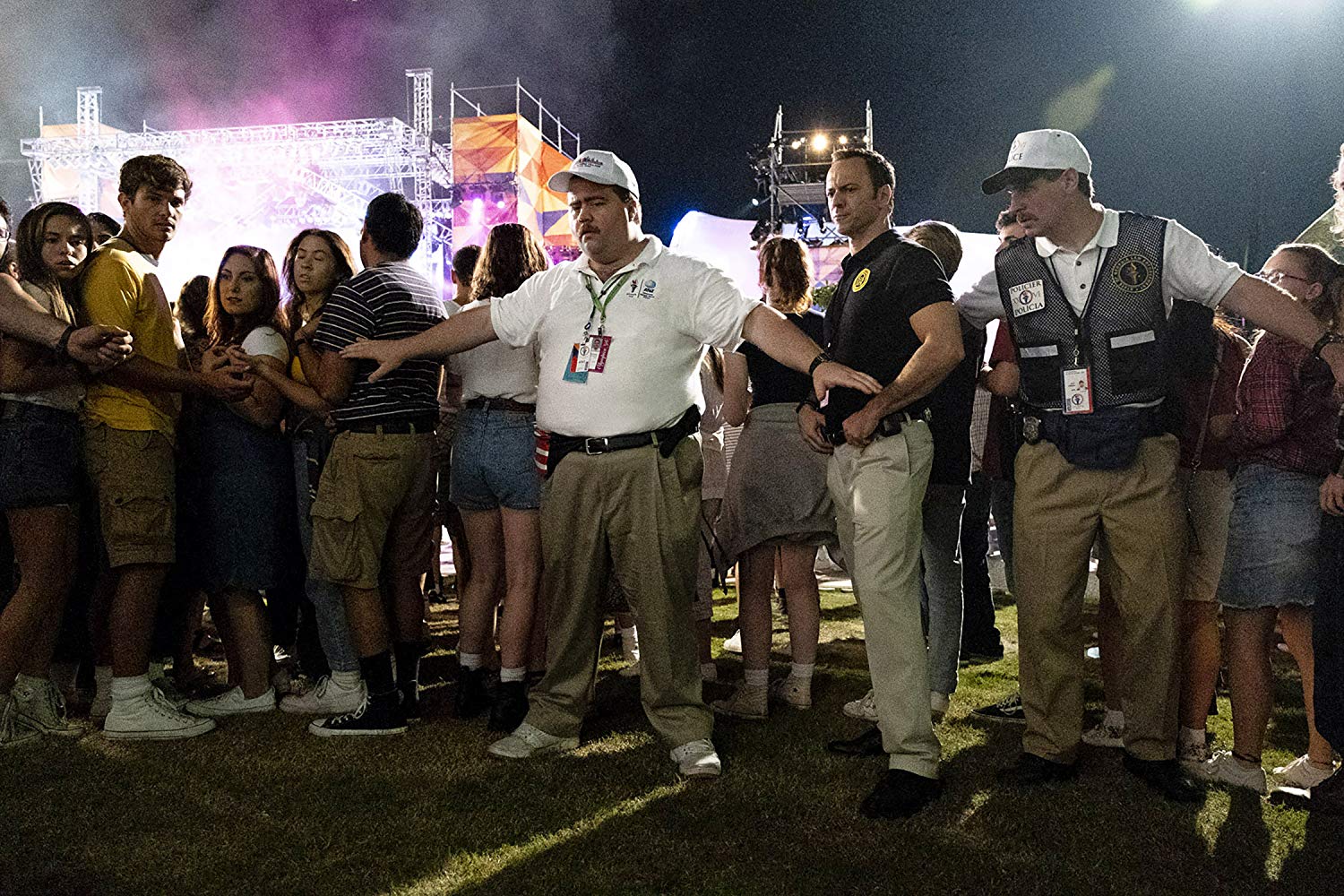On July 27, 1996, a pipe bomb exploded in Centennial Park, Atlanta killing local Georgian Alice Hawthorne and Turkish cameraman Melih Uzunyol -I’m naming them because the film sure as Hell didn’t. This attack took place during the Olympic Games and, hence, received a tremendous amount of attention. Despite an actual bodycount>0, however, director Clint Eastwood decided the true victim of this crime was white mallcop Richard Jewell, the man who discovered the bomb and was pronounced a hero for about 72 hours until the FBI started investigating him. Unlike most of the sympathetic figures of this ilk, Richard wasn’t killed, beaten, raped, or jailed. Richard was instead mercilessly hounded and called bad words again and again… and all because he had access, motive, and fit perfectly the profile of the kind of villain who would do such a thing.
Now don’t get me wrong, Richard Jewell (Paul Walter Hauser) is a hero. His actions saved lives that summer day. I just don’t see him as a major motion picture-type hero; to me, he’s more of a “plaque in Centennial Park” or Hallmark Channel hero. Watching the film devolve from an exciting recreation of the July 27 explosion into a modern-day Poor Richard’s Almanac, a diatribe shaming the FBI and the media for their role in the events that followed, was not -IMHO- the best way to spend every little bit of the last 90 minutes of film.
The film never does mention who else died in the attack, nor any of the other avenues the FBI might have explored. Richard Jewell is laser-focused throughout on exactly one thing: the vilification of Richard Jewell. And there is serious vilification; lacking additional leads and almost certainly feeling pressure given the surrounding Olympic Games, the FBI identified bomb-noticing hero Richard as a potential suspect. Their investigation discovered several uneasy facts: Richard Jewell was a failed cop; he lived at home with his mother, had a small arsenal of “hunting equipment,” glorified law enforcement, and routinely abused his authority as a security agent when given such.
It is fair to say this film is a sympathetic portrait of Richard Jewell, no? Yet even in the most generous light, Eastwood describes Jewell as a daft, homophobic man-child, a sycophant of all men in blue, and somebody who didn’t have a problem overstepping bounds. There are two scenes in this film in which Richard –while representing law-and-order- confronts underage alcoholism. In both cases, the minors are depicted as belligerent punks while Richard acts as the “voice of reason.” We are supposed to be outraged when Richard Jewell, only acting in the best interests of all, is treated rudely then called onto the carpet for abuse of power. Ok, um, movie … “adult said/child said” is not really why he gets fired from security jobs; it probably has more to do with the “impersonating an officer” or “making traffic stops when he’s not a traffic cop” stuff.
The film goes into depth with the frustrations of lead FBI agent Tom Shaw (Jon Hamm), who would literally cross the river Styx to push his narrative: Jewell is dirty. It’s not just the FBI and their harassing, questionably legal tactics looking bad here; Clint also has a big problem with reporters telling us what the FBI is investigating. Atlanta Journal reporter Kathy Scruggs (Olivia Wilde) is probably an amalgam of all press infractions that occurred around this event, so she takes the lion’s share of Eastwood’s wrath. This character is so loathsome that minutes following the explosion, she’s literally praying not for the victims, but for a good scoop. Sure, mock the press, but gee, Clint, if you don’t mention the victims either, who is the real vulture here? This all reminds me – from a pure viewer point of view, the acting is wrong –flat out wrong- in several scenes. (Don’t believe me? Check out how Kathy Bates’ expression changes before she’s heard bad news on the TV … that’s just shitty directing, plain and simple.)
What happened to you, Clint Eastwood? I grew up with your films. I understood the lessons perfectly. For decades you taught me that lawlessness in the pursuit of dispatching evil was not only necessary, but heroic (i.e. “the ends justify the means”). Now the opposite is true?! Let’s say Richard Jewell was actually guilty. Hear me out. The man is a hero, but suppose he were the villain. How would you treat the FBI ruses to collect evidence on him? Clever, right? Or how would you treat the media harassment? Completely justified, right? In both cases, “he had it comin’.”. So what exactly has changed here? Everyone is supposed to magically infer that Richard is innocent and treat him accordingly?
There’s a price for the Dirty Harry mentality and this is it; you think the extreme methods of procedure-be-damned policing have not left their mark? You think Dirty Harry never got it wrong? How was it ok to harass the bad guy when you played a cop, but suddenly bad news when you’re behind the camera. “Richard Jewell was a hero?” Why should anybody in law enforcement treat that statement as a given?
It can’t possibly go without notice that the devils of this film, the FBI and the media, are two of President Trump’s favorite whipping boys. The litany of anti-government rhetoric infuses this film to an ugly extent. “Good guy” lawyer Watson Bryant (Sam Rockwell) has a poster behind his desk visible in at least a half-dozen shots reading, “I fear government more than I fear terrorism.” Then there’s the line: “If he’s an innocent man, what are the FBI doing here?” Funny how that question amounts to sarcasm only when white people are involved. And then there was the priceless foreign-lady observation, “in my country when the government says you’re guilty, it’s a sure sign that you’re innocent.” Are you sure you don’t have any more empty libertarian mumblespeak to add, Clint?
To Clint Eastwood, Richard Jewell is the height of sympathy, the white man with good in his heart and a sycophantic, even potentially detrimental, allegiance to authority. This love letter to the tragic heroics of Jewell makes me wonder which is the real tragedy in your view: that people died or that a white man was made to feel uncomfortable?
As with pretty much everything touched by a conservative voice these days, Richard Jewell will make you angry. Geez, I thought my side was full of self-righteous pricks, yet conservative whining in 2019 makes hippies look like vulcans. And conservatives screaming at the podium these days are self-righteous pricks even without morality or fact on their side which makes me wonder what do you guys really want –I mean besides POWER? Lemme put it this way: what, Clint, do you hope is the result of this tirade against the FBI and the media? That the FBI stops investigating prime suspects, guys who fit profiles? That the media take no interest in FBI activity? Or, maybe you want what Trump wants – – the FBI and media only act on his approval. That’s a police state, Clint. That’s fascism. Count me out.
The biggest problem in our country right now is not that the FBI and the media aren’t doing their jobs, but the shocking lack of accountability among power brokers and the forces that enable them on a daily basis — like this film. In the view of Richard Jewell, there should be even less of this accountability. I’m sure the makers of this film saw it as a spot-on representation of our current state of affairs, yet given how much our lawless president rails against FBI and media, I think this is the exact wrong time to point out how Richard Jewell was robbed of his dignity.
A bomb exploded on the block
Leaving an Olympics in shock
Two died without reason
Hence, there’s treason
Behind it, surely Hillary or Barack
Rated R, 131 Minutes
Director: Clint Eastwood
Writer: Billy Ray
Genre: Trumpin’ stumpin’
Type of being most likely to enjoy this film: Richard Jewell
Type of being least likely to enjoy this film: The FBI, the Atlanta Journal Constitution




